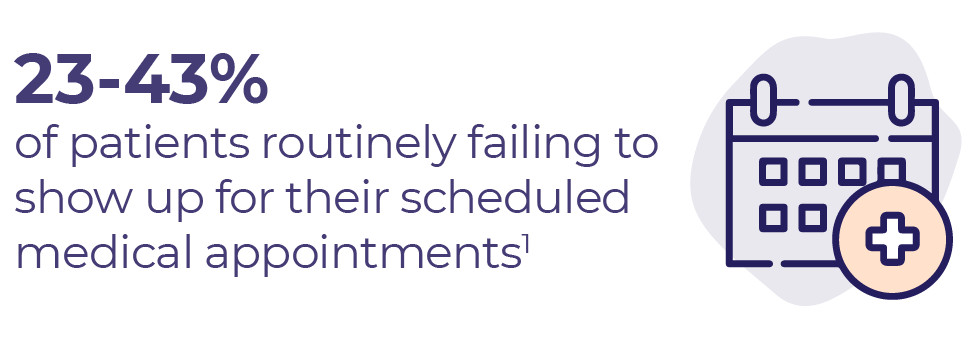An Urgent Need for Efficiency in the Healthcare System
Our acute response to the COVID-19 pandemic has resulted in serious healthcare delays for many people seeking primary care, medical tests, or ongoing treatment of disease. For instance, by some estimates, nearly 16 million medical procedures have been put on hold in Ontario alone. This has been done to avoid infection or because of healthcare resource shortages. However, this delay in medical treatment has led to a secondary and invisible epidemic – that of neglected healthcare needs.
While many patients have been able to receive care through virtual appointments, the large-scale procrastination of in-person care that we are seeing poses a significant burden to the system as we transition back to our former status quo. Limited healthcare capacity aside, there is one human factor that exacerbates the current situation: appointment no-shows.

No-shows have been a long-standing problem, with anywhere from 23-43% of patients routinely failing to show up for their scheduled medical appointments. Healthcare professionals and leaders need no convincing that this tendency is problematic and uneconomical on many levels. There are also no signs that the pandemic has made people more likely to honour their medical commitments. While virtual visits out-perform in-office visits, physical visit no-shows have actually increased by 7% (29% to 36%) during the pandemic.
It may seem surprising that patients miss their appointments, as we all want to be in good health. However, this behaviour is not unexpected when viewed from a behavioural science perspective. Missed appointments highlight a classic concept in psychology: the ‘say-do-gap’ which emphasizes how our intentions do not always translate to action. One good example of this is poor medication adherence. Up to 50% of patients with chronic illness do not take their medications as prescribed. We similarly struggle to act on our intentions in many other aspects of healthcare – exercising regularly, or eating healthy are always more difficult than anticipated.
Before we think about how we might mitigate the issue of appointment no-shows, it’s important to take a step back and look at the challenges that healthcare providers and patients currently face from a scientific perspective. Doing so will allow us to make smart decisions about how to proceed in the future.
An Ongoing Problem in a New Light: Appointment No-Shows
 The current pandemic is highlighting the importance of efficiency in the healthcare system as it deals with this backlog of healthcare needs. This need is compounded by the forecasted strains to the system due to demographic factors, which were in play long before the onset of Covid-19. This is where no-shows pose a serious problem: they are not only a problem for the growing healthcare needs of patients, but they generate inefficiencies in healthcare providers’ ability to utilize resources, for patients to manage their conditions, and all in all result in higher costs for the healthcare system. Further, missed appointments drive up wait times, further delay care for other patients, and increase the burden placed on already exhausted healthcare providers.
The current pandemic is highlighting the importance of efficiency in the healthcare system as it deals with this backlog of healthcare needs. This need is compounded by the forecasted strains to the system due to demographic factors, which were in play long before the onset of Covid-19. This is where no-shows pose a serious problem: they are not only a problem for the growing healthcare needs of patients, but they generate inefficiencies in healthcare providers’ ability to utilize resources, for patients to manage their conditions, and all in all result in higher costs for the healthcare system. Further, missed appointments drive up wait times, further delay care for other patients, and increase the burden placed on already exhausted healthcare providers.
The current pandemic may have, to some degree, masked a few of these issues by shifting medical care to the virtual realm (where appointments are naturally easier to keep). However, virtual care is not the sole answer to our problems in the long-term – nor does it necessarily solve the problem of no-shows that awaits, as some patient will inevitably need in person medical care. Although virtual visits reduce friction, and increase accessibility, other issues may arise such as difficulty accessing internet, ‘zoom fatigue’, cognitive impairment, disability, or the challenge of finding a private moment with our phone or laptop.
Both digital healthcare companies, as well as in-person healthcare clinics, will need to tackle the historical problem of appointment no-shows and adapt to ensure that patients are getting the care they need. Since this problem has not been adequately dealt with in the past, and healthcare needs are only growing because of COVID-19, the need for strategies to address these inefficiencies is more pressing than ever.
The Current Methods to Solve No-Shows Are Not Working
Historically, there have been several logistical challenges when attempting to reduce or avoid appointment no-shows.
Scheduling causes friction
Firstly, contacting patients by phone to remind them of appointments is time-consuming and can be inefficient, especially if a patient is difficult to reach. Further, automated phone reminders are associated with privacy concerns, since they risk divulging personal health information to family members or friends rather than the person receiving care. Such issues can also have serious legal ramifications for healthcare providers considering sending automated online reminders, which deters providers from using these methods. Further, research has shown that patient no-shows can persist even with reminder systems, which further demonstrates that current systems are not working.
Appointment lead times are long
Another systemic challenge contributing to missed appointments is the length of time in advance that appointments are made. Appointments booked several months ahead can lead to patient forgetfulness, changing perceptions and priorities, and a requirement for greater effort on behalf of both parties to ensure the appointment is kept. Miscommunication between care providers and patients becomes another a concern, especially for particular demographics, like the elderly.
So Why Do Patients Keep Missing Healthcare Appointments?
 Now that we’ve taken a look at some of the logistical challenges at the root of appointment no-shows, it’s important to examine the elements of human motivation and behaviour that arise on the patient journey between scheduling and attending an appointment. There are some key behavioural challenges that patients commonly face.
Now that we’ve taken a look at some of the logistical challenges at the root of appointment no-shows, it’s important to examine the elements of human motivation and behaviour that arise on the patient journey between scheduling and attending an appointment. There are some key behavioural challenges that patients commonly face.
Forgetfulness:
Forgetfulness is one of the most commonly reported reasons for missed appointments. Oftentimes appointments are booked several months in advance, and if an effective reminder is not provided, it becomes very easy for a patient to forget. Moreover, even when reminders are provided, patients may become busy and forget to cancel as the appointment may no longer be top of mind.
Perceived sense of urgency or obligation:
Another behavioural barrier may be a reduced sense of urgency for the appointment, especially when appointments are several months away. Although patients may need care, they might not follow-through due to diminishing motivation or an unclear sense of the impact on their health. Further, a patient may be more likely to miss an appointment if their perceived consequences for missing an appointment are low or they do not feel obligated to attend. A low sense of obligation could arise due to a negative healthcare experience, feeling disrespected, or a dislike or disregard for the medical system. Alternatively, patients may simply not grasp the potential negative effects missing an appointment could have on the health care provider or on their own health.
Cognitive Friction:
Another potential barrier impacting appointment follow-through is the friction inherent in scheduling, potential re-scheduling and communicating appointment reminders or changes. Although smooth and clear communication between health care providers and patients is the ideal, this does not always happen in practice. Every added step involving communication leads to opportunity for information to be missed or misinterpreted, resulting in a no-show.
Anxiety and Fear:
Lastly, patients may be nervous about an upcoming appointment due to fear of bad news or aversion to an uncomfortable situation. Dealing with illness or the possibility of illness can generate anxiety and lead to avoidance. This anxiety, if not dealt with, can ultimately lead to no-shows and worse outcomes for the patient.
Understanding and addressing patient behaviour will be critical to overcoming this challenge and ensuring efficient healthcare in a post-COVID-19 world. We need to be equipped with effective behavioural strategies to motivate patients to keep appointments.
How can we make use of behavioural strategies to nudge patients toward better outcomes?
Understanding and addressing patient behaviour will be critical to mitigating appointment no-shows and ensuring efficient healthcare in a post-COVID-19 world. We need to be equipped with effective behavioural strategies to motivate patients to keep appointments.
1. Make it easy for the patient
Providing patients with tools to help them remember an appointment will be critical, especially with the shift towards digital healthcare. Fewer people are relying on the mail or telephone for reminders, and the resources available to nudge patients to attend their appointments will need to accommodate patients’ diverse and changing needs. Overcoming challenges related to patient privacy will be important for developing the necessary tools and incorporating them into mainstream healthcare practices.
2. Emphasize the outcomes
Oftentimes we are blind to the outcomes of our choices – we have a tendency to think about our present needs and avoid thinking about the future (otherwise known as present bias). Clearly communicating the impact that missing a healthcare appointment may have on a patient is a powerful strategy. Understanding illness and health behaviours can be confusing for the patients and what they stand to gain from showing up for an appointment is not always obvious. Clear and effective communication from a health care professional that emphasizes the importance of an appointment helps patients to stay invested in their care. Further providing feedback or data to patients can help them visualize progress and quantify the impact on their health.
3. Create consistency
Scheduling or re-scheduling appointments is just another item on a long to-do list. Providing consistency and simplicity in the booking process helps to ensure that communication flows more smoothly. Further, consistency is essential for creating an environment where patients can form habits and simple repetition can have dramatic effects on our ability to learn and remember information.
4. Create an environment of support
Patients may feel isolated navigating difficult health issues in a complex system. Fostering compassion in communication with patients can help to mitigate fear and discomfort by reducing the aversiveness of the situation. Further, a patient’s most recent experience may have been uncomfortable or frightening, leaving them with a negative association. Ensuring that a patient leaves feeling supported can improve the chances that they return.
These are some high-level behavioural strategies for overcoming barriers to patient no-shows in a healthcare setting. With a rapidly changing healthcare system, providers, organizations and digital health services will need to adapt to work towards an efficient system with better outcomes for all. The future of efficient healthcare depends on it.










